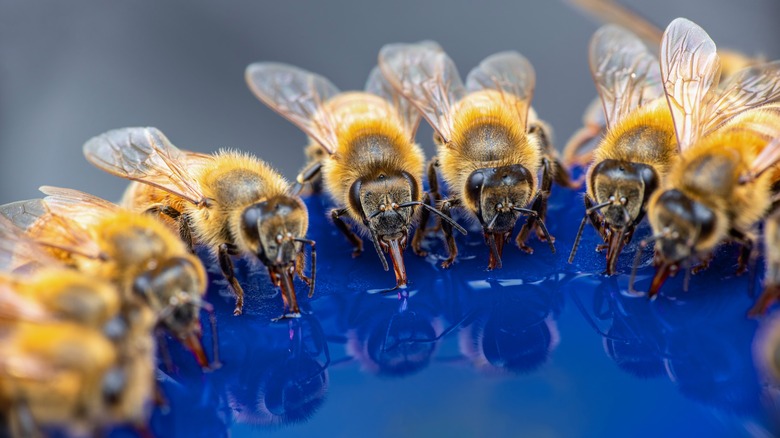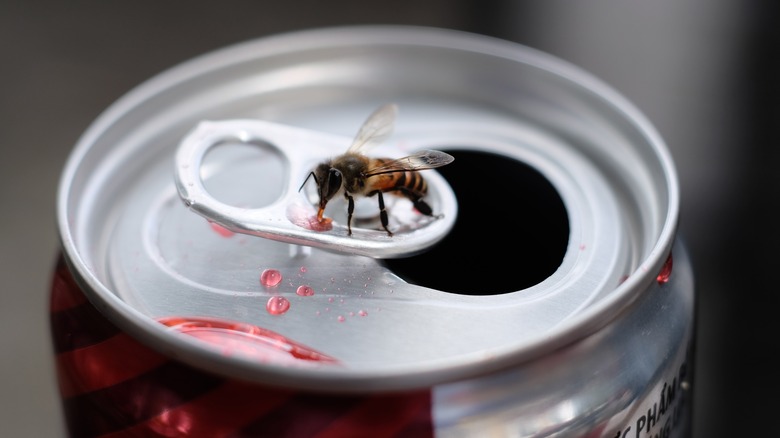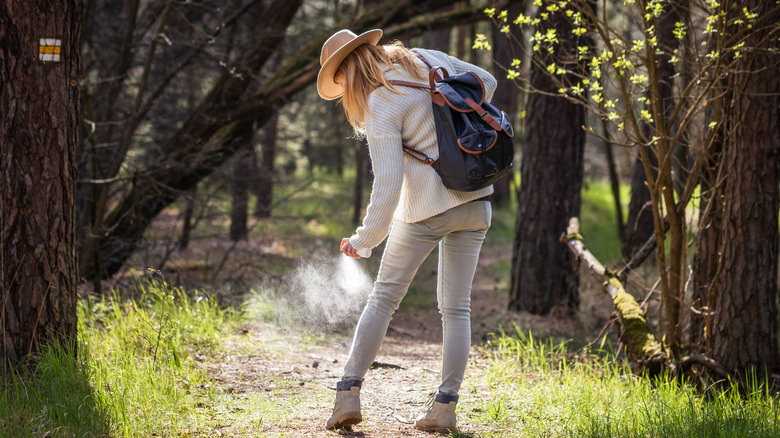Keep Bees Away From Your Campsite With These Tips
As wonderful as bees are for the environment, they can be a nuisance when they're hanging around your campsite. From fragrant sunscreen to a hearty campfire lunch, they seem to be attracted to just about everything. Research shows that bees are foraging generalists, meaning they'll investigate anything sweet that bears a resemblance to the nectar they find in flowers. If bees have been successful in acquiring food at a campsite in the past, they'll continue to hang around. Look closely in high traffic areas and you may spot a beehive in a hollowed-out tree or a hole in the ground, so watch where you step.
When picking a campsite, look for areas that are free of existing hives and far away from flowers, tall grasses, and fruit trees. Though you can take steps toward a bee-free camping trip, remember that you're in their environment and some wildlife is to be expected. Know that bees aren't out to sting you, but they will defend themselves if they feel threatened. Avoid swatting them or trying to kill them. Instead, gently use your hand or a piece of paper to move bees away, suggests the US Forest Service.
How to protect your campsite
Once you pick a campsite, set up a few bee deterrents around your space. The sugar bottle trick is one popular method. Cut the top off a soda bottle, fill it halfway with water, and add a cup of sugar. Hang the mixture from a tree about 500 feet away from your campsite. Instead of pestering you, the bees will be more than happy to lap up the sugar water. Another trick is to bring a handful of brown paper bags and blow them up to full capacity. Strategically place them in the trees surrounding your campsite. Since bees are territorial, they will avoid other (perceived) bee hives and be more likely to leave you alone.
Start the campfire for cooking as soon as possible, as bees are naturally repelled by smoke. Be diligent about covering your food and drinks, especially sweet-smelling items like barbeque sauce, soda, fruit juice, candy, cookies, and pancakes drenched in maple syrup. Always tidy up after a meal, being mindful of any crumbs or spills along the way. It's a good idea to keep all of your food in airtight containers, preferably stored in a vehicle. Remember to keep your tent zipped up and your car windows rolled up. Standing water will also attract thirsty bees, so keep lids on your dish buckets and water bottles. While you're at it, close the lid on your garbage can.
What to pack for a bee-free camping trip
While deterring strategies can be helpful, they don't always do the trick. In that case, pack a few essentials for your trip, including muted, neutral clothing. Bees are excellent at recognizing bright colors and floral patterns, as they depend on hundreds, if not thousands, of flower species to survive, per a 2022 study published in Philosophical Transactions B. If you wear bright blue, purple, and yellow clothing, they're more likely to come over and investigate you.
Unscented toiletries can also be useful, including your shampoo, conditioner, lotion, and sunscreen. Avoid floral-smelling perfumes and deodorants. Some campers have good luck keeping bees away by wearing vanilla extra on their touch points (neck, temples, wrists) and spraying essential oils around the campsite like clove, eucalyptus, geranium, lemongrass, peppermint, and citrus-based smells. A bug net can also be useful to keep annoying bugs away.
Though honey bees are less aggressive than hornets and wasps, getting stung is still a possibility. If a bee stings you, have someone pull out the stinger with a credit card, apply some ice, and take an antihistamine from your emergency first aid kit. If you suspect you could be allergic to bee stings, bring an Epi Pen just in case. If you've tried everything and you can't switch campsites, stay calm and learn to co-exist with them. When you do your best to respect nature, nature will respect you, too.


